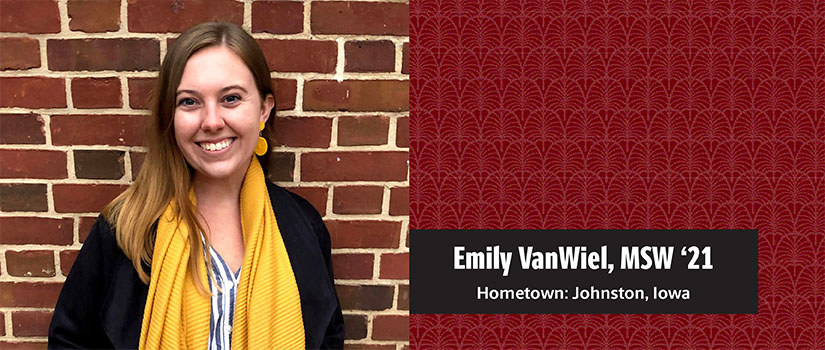Social Work and communications are two degrees that may not have much in common. Master of Social Work student Emily VanWiel graduated from the University of Iowa with a degree in communications studies in 2018.
But according to VanWiel, one of the tracks of her communications studies program was interpersonal communications, which incorporated elements of psychology and sociology. This helped her realize that she could utilize her communications studies for her passion of obstetric counseling to help women deal with difficult pregnancy issues.
“Some of the theories from my communications studies courses are the same ones I’m learning here,” VanWiel says. “I was at crossroads in my junior year of what I wanted to do with my degree. But after talking with people pursuing social work and taking an introductory course, I found it appealing that I could take my passion to help and connect with others.”
VanWiel initially had no interest in the evolving field of obstetric counseling. But as an undergrad, she wrote a research proposal on women with infertility and how they communicated to their families, such as through therapeutic interventions or professional help.
“I met with a woman who works with those dealing with perinatal loss, those who lost their baby during or after birth, and postpartum mood disorder,” VanWiel says. “The professor I worked with had three projects that she was looking for someone to research and write proposals. Women with infertility was the one that was the most interesting.”
VanWiel added that infertility, miscarriages and postpartum depression were previously a taboo topic. But social media is one outlet where women can talk and de-stigmatize those subjects and understand how social workers can help.
“Everyone’s situation is different, so someone who has expertise in obstetric counseling is useful and more beneficial than a general social worker,” VanWiel says. “There are specific catalysts for depression, mood disorders, or other conditions.”
VanWiel completed her field placement last semester as part of the Prisma Health Palliative Care. She is still at Prisma Health this semester and utilizes her passion in the labor and delivery unit.
“I asked a social worker who specializes in maternal mental health about what was most beneficial to her,” VanWiel says. “She said that her field placement on a labor and delivery floor was one of the most useful frameworks to understand hospital case management.”
VanWiel’s supervisor is alum Sade Brown, MSW ’17, a hospital social worker in the labor and delivery unit. She assists Brown in performing assessments for high-risk patients or those who have previously been involved with the Department of Social Services. This may include teen pregnancy consultations if the patient is below the age of consent, or a required consultation for a positive drug screen. VanWiel often works with moms in risky social situations, such as unsafe living spaces or insufficient social support.
“We sometimes have in-patients who are with us for six weeks and provide resources if they have kids at home and limited social support,” VanWiel says. “We may also get consulted for neo-natal loss and provide free resources, support counseling, and group therapy options in their counties.”
While VanWiel says most of her field placement is what she expected, there have been some unexpected aspects. For example, she was unaware of how many different areas are called on for consultation and labor and delivery’s coordination with DSS, even in non-risky situations.
“I didn’t realize the different moving parts,” VanWiel says. “For example, all our moms are in antepartum prior to labor. We work with those moms who have pre-term labor and stay with us long term. I never anticipated we would have as many patients with us for multiple weeks. Even though I thought it would be a faster turnaround, it's nice that we can provide continued care for those who are with us for an extended stay.”
VanWiel also believes her field placement has provided her with extensive experiences with a variety of cases. Each time she enters a room and works with moms from different demographics and social situations, it helps her confidence and allows her to be more competent as a practitioner.
Those experiences will be vital as VanWiel will continue working in a hospital after graduating next month and receiving her social work licensure. She recently accepted a position as a social worker in the pediatrics department, specifically cystic fibrosis, at a Baltimore hospital.
“My job will be in a similar department to labor and delivery, but I can definitely see myself either transferring back to that population or staying in the pediatrics and cystic fibrosis area,” VanWiel says. “It's a new area for me, and I’m looking forward to something that’s fresh and exciting.
Hospital social work and case work is often fast-paced, but when an opportunity presents itself, I could see myself spending more one-on-one time with patients and clients.”
